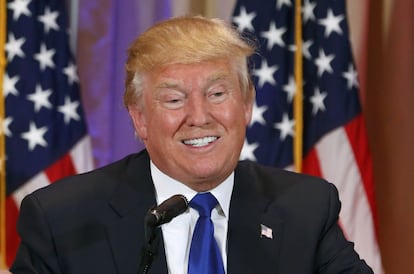What Berlusconi says about Trump
There is another extravagant multimillionaire who achieved inexplicable success (from an outsider’s perspective). Here are a few lessons that were learned

A middle-aged multimillionaire real estate mogul with a major presence in the media who likes much younger women. A histrionic figure with a penchant for boastful speeches and sexist and xenophobic statements alights on the national political stage of a Western democratic country with his hyperbolic, ideologically unconventional rhetoric and wins popular support, which seems incomprehensible for the outside world. Donald Trump? Of course. Or Silvio Berlusconi...
The meteoric rise of the New York magnate has left half the world dumbstruck. How can such a politician win in the democracy that Alexis de Tocqueville admired nearly two centuries ago? Just as a leader like Berlusconi maintained power for two decades in a country with millennia of refined political culture. In the exegesis of the Trump phenomenon, observers, supporters and sufferers of Berlusconi’s 20-year reign have some measure of perspective.
First, they know that broadsides, gaffes and insolence do not mean we are not looking at an astute political strategy: perfect rhetoric for the times when the West is less sure of itself, more fearful.
Obviously, there are many differences between Berlusconi and Trump. Trump sounds more radical than Berlusconi. But both seem able to speak – with words and deeds – to large sectors of Western society disappointed with the way things are. Those who are worried about changes caused by immigration, those whom globalization and technological advances have dislodged from their place in the workforce, stripped of their faith that the future would always be better. People who have fallen on hard times and who are disoriented and so turn to the nostalgic past and its values, clinging to their national identity, but to the identity it had when things were better for them and their forebears. Make America Great Again! And Forza Italia! People who resent the old political class that failed to give them the solutions they wished for and protect their status and expectations of success.
Many politicians use a similar strategy, promising to preserve the legendary qualities of societies that, in spite of their best efforts, will inexorably change. These are the waters of Le Pen, Orban, Kaczinski. “In the end, what we would like is to return to life in the city of our childhood,” a retired car factory worker from Villers-Cotterêts, a French city led by the National Front, told a reporter from this newspaper recently.
To paraphrase Karl Popper in his famed work, “The Open Society and its Enemies,” maybe Trump, Berlusconi and his allies in the Northern League, Le Pen, Orban, and Kaczinski could say they are the friends of closed societies.
But Trump and Berlusconi have distinguished themselves from the others by the sheer force of their personalities and their aura of financial success, which attracts many admirers. A powerful factor not to be underestimated. Just like their total contempt for political correctness and moderation that many see as bravery and which echo the sentiments many do not dare defend openly. With fears.
The anti-Berlusconi era offers two lessons for Trump’s adversaries. When it comes to feelings, sometimes rational arguments are not enough. And, demonization and ridicule are counterproductive. When you strike the leader, you humiliate those who think like him. And there are many. They are looking to make up for lost time. Make America Great Again.
English version by Dyane Jean Francois.








































